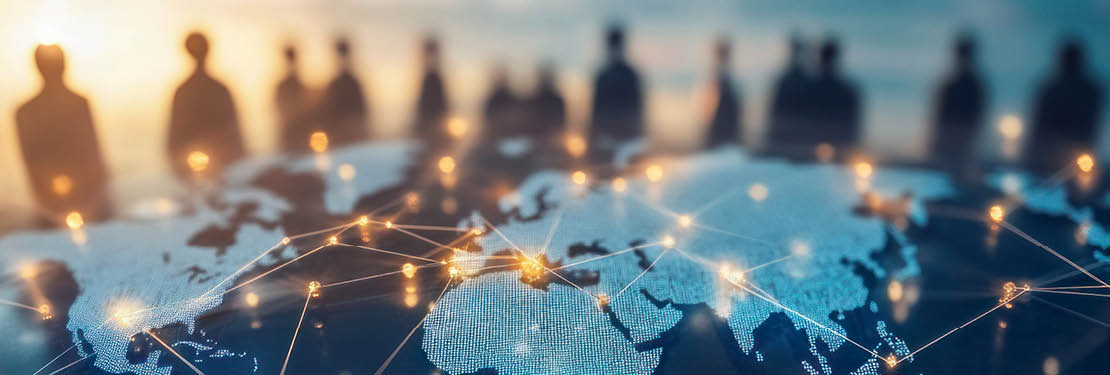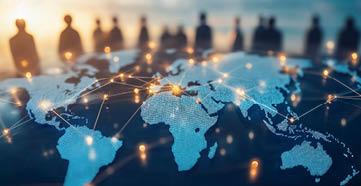Wednesday 10 September 2025

A new comprehensive report from the International Bar Association (IBA) Communications Law Committee examines the ongoing global debate over who should bear the cost of internet infrastructure, expansion and maintenance. It is a controversial issue revolving around whether end users and content providers should continue to foot the bill in order to maintain a single, low-barrier internet or whether infrastructure expenses should be recouped from those who produce the most traffic.
The report, titled The Fair Share Debate: Global perspectives on who should contribute to internet infrastructure (the Report), provides an overview of the complex and evolving discussions around the concept of ‘fair share’ – specifically, if large technology companies like Alphabet (Google and YouTube) Amazon, Apple, Meta (Facebook, Instagram, WhatsApp), Microsoft and TikTok should pay a portion of the costs for maintaining and expanding internet networks.
Angela Flannery, Co-Chair of the IBA Communications Law Committee, said about the IBA Communications Law Working Group on Fair Share – created to undertake research to inform the Report: ‘Our goal was to move beyond headlines and rhetoric, offering a rigorous, evidence-based perspective on the complexities of network funding in today’s interconnected digital landscape. This debate has been ongoing since at least 2012 and involves a variety of perspectives from regulators, industry players, governments and civil society. It is an issue that lies at the intersection of net neutrality, telecoms regulation, digital industrial policy and consumer protection, raising fundamental policy questions that need to be addressed.’
The industrial and economic problems that arise in the internet ecosystem from the imbalance between telecommunications operators and over-the-top (OTT) service providers – businesses that send media content (like audio, video and other content) straight to customers via the internet, avoiding traditional broadcast, cable or satellite television providers – are covered extensively and evenly in the Report. Examples of these service providers include Netflix and Disney+ for video, Spotify for audio and WhatsApp for communication. These services offer a flexible, on-demand way to consume content on various devices like smart TVs, smartphones and computers.
Key highlights from the Report:
The core issue: telecom operators argue that major online platforms generate significant internet traffic and should contribute financially to network costs. Conversely, technology companies contend that their services drive network modernisation and investments, and imposing additional fees could threaten open internet principles and discourage innovation.
Models of fair share: the Report outlines three main theoretical approaches:
Interconnection model: negotiated fees between content providers and telecoms companies for traffic exchange.
Universal service contribution model: content providers pay taxes based on traffic, with funds used for infrastructure.
Regulated peering model: fixed prices for interconnection.
Global perspectives:
In Europe, the debate gained momentum in 2023, with the then-European Commissioner Thierry Breton supporting fair share initiatives, though many European Union member states and regulators have expressed caution, citing potential risks to investment and net neutrality. The EU is considering future legislation, including the upcoming Digital Networks Act, which may shape the region’s approach.
In Australia, the discussion has been limited, partly due to the country’s strong public investment in broadband infrastructure through the government-owned NBN Co.
In India, the debate continues without concrete legislative changes, with discussions focusing on whether large tech firms should pay a fair share to support network costs.
In Latin America, countries like Argentina, Brazil, Colombia, Mexico and Peru are engaging in discussions, often emphasising that a small number of platforms account for the majority of internet traffic – highlighting the potential for fair share models.
South Korea has implemented a regulated peering model since 2016, which sets prices for interconnection between operators, and introduced a ‘Netflix law’ in 2021 to ensure content providers invest more in streaming quality.
In the United States, regulators like the Federal Communications Commission (FCC) have debated requiring Big Tech companies to contribute to the universal service contribution model for large traffic generators to pay tax collected by the state, with recent initiatives led by FCC Chair Brendan Carr. However, the Trump administration has recently taken a very negative stance towards fair share and has warned the EU that such legislation could be seen as a barrier to trade and therefore likely to lead to retaliation.
Innocenzo Genna, Senior Vice-Chair of the IBA Communications Law Committee commented: ‘The Internet thrives on complementarity, and any regulatory solution must recognise the shared responsibilities and contributions of all stakeholders, rather than reducing the issue to a simple contest between OTTs and telecoms. Any regulation must take into account the roles and contributions of all actors to ensure balanced and fair outcomes.’
Mario Di Carlo, Working Group Officer of the IBA Communications Law Committee, stated: ‘As regulators contemplate new interventions, it is crucial to carefully weigh both intended benefits and, as far as possible, unintended effects, to ensure that measures support innovation, competition and the long-term health of the digital ecosystem. Any regulatory intervention should be firmly based on comprehensive, data-driven analysis and sound economic assessments that will support a sustainable and inclusive internet environment.’
The research of the IBA Communications Law Working Group on Fair Share covered a period from January 2022 to May 2025 and does not include subsequent developments such as the recent negotiations between the US and the EU resulting in the Framework Agreement on Reciprocal, Fair, and Balanced Trade published on 21 August 2025, addressing so-called ‘network usage fee regulations’.
ENDS
Contact: IBApressoffice@int-bar.org
Notes to the reader:
Click here to download a FREE copy of The Fair Share Debate: Global perspectives on who should contribute to internet infrastructure from the IBA website.
The IBA Communications Law Working Group on Fair Share is comprised of six law firms represented by:
Australia: Angela Flannery, Partner; and Cate Cloudsdale, Counsel, Quay Law Partners, Sydney
European Union: Innocenzo Genna, Partner, Attorney and DTD legal advisor, Brussels-Rome, Italy.
India: Palak Kapoor, Member, TMT and IP Practice; Vaibhav Parikh, Head, M&A, PE and Technology Law Practice; Aaron Kamath, Leader, Technology and Transactions Practice, Nishith Desai Associates, Mumbai
Latin America: Andrés Fernández de Castro Muñoz, Director TMT Practice, Brigard Urrutia, Bogotà
South Korea:Dayeon Ahn, Partner, Yulchon, Seoul
United States: Mario Di Carlo, Partner, Studio Legale Ristuccia Tufarelli e partners, Milan
The IBA Communications Law Committee is a leading global forum for legal practitioners with specialist expertise or interest in the communications sector. The Committee offers members access to a worldwide network of leading practitioners, in-house counsel and regulators active in digital, communications and media markets. The sharing of sectoral expertise is encouraged through regular publication of articles, periodic issues of the Committee’s technical journal, its annual conference hosted jointly with IBA Antitrust Section and specialised sessions at the IBA Annual Conference. The scope of the Committee’s work covers network, service and content-related developments across all delivery platforms. This provides members with access to practical global perspectives on the array of technological, commercial and policy issues which confront communications lawyers, their companies and clients.
The International Bar Association (IBA), the global voice of the legal profession, is the foremost organisation for international legal practitioners, bar associations and law societies. Established in 1947, shortly after the creation of the United Nations, with the aim of protecting and promoting the rule of law globally, it was born out of the conviction that an organisation made up of the world’s bar associations could contribute to global stability and peace through the administration of justice.
Find the IBA on social media here:
Press Office
International Bar Association
Chancery House
53-64 Chancery Lane
London WC2A 1QS
United Kingdom
Mobile: +44 (0)7940 731 915
Main Office: +44 (0)20 7842 0090
Email: IBApressoffice@int-bar.org
Website: www.ibanet.org
Website page link for this news release:
Short link: https://tinyurl.com/58xmzuwm
Full link: https://www.ibanet.org/New-report-from-the-IBA-Communications-Law-Committee-explores-the-fair-share-debate-in-internet-infrastructure-funding

